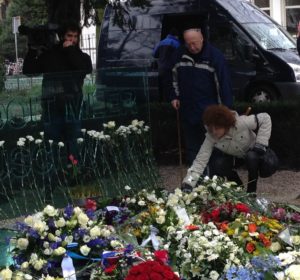
Marcher places flowers at Amsterdam’s Auschwitz memorial
The New York Times reports that the Dutch are constructing a memorial wall and Holocaust museum in Amsterdam’s old Jewish Quarter because memory is fading or inaccurate – despite the worldwide readership of The Diary of Anne Frank. There is so much more to the story than one brilliant child writer’s account, despite her humanitarianism and universal appeal.
Historians have grappled endlessly with the question of how and why one of the most tolerant nations in the world allowed almost three-quarters of its Jewish population to be murdered. It’s especially ironic since the Netherlands was a refuge for Jewish people since the Spanish Inquisition.
While the answers to “Why?” are many and complex, a primary one is that the Dutch believed it couldn’t happen there, even after the Nazi invasion. The Jewish people had been assimilated for centuries, in professions from symphony conductors to medicine and art, shopkeeping, peddling, diamond cutting and trading. The head of the Dutch Supreme Court was Jewish. It was preposterous to think that people so integral to society at every level could be isolated and shipped off somewhere. Much less murdered. No matter what the Germans were doing in their own country, it couldn’t happen in the Netherlands. Dutch people wouldn’t allow that.
Hiding was the best policy
Nor was it only the Dutch Gentiles who believed this. In doing the research for my historical novel, An Address in Amsterdam, I learned that many Jewish people themselves refused to believe that persecution would turn into isolation, much less deportation and mass murder. At each step – registration, identity cards, restricted travel and business, stars, even deportation – some people continued to rationalize the Nazis’ actions. Others, like my fictional heroine, resisted. Only one Jew in seven hid, which turned out to be the best way to survive the war other than pre-emptive escape. Dutch Jewish citizens felt a misplaced confidence in their country and countrymen – much like the confidence many in the U.S. are feeling now, as we complacently believe that Donald Trump can’t win. Instead, we hear more and more hate rhetoric aimed at Muslims, refugees, and undocumented workers and their families. What can we do to provide them with the protection which the Dutch failed to give the Jewish part of their people?
What are we refusing to believe in 2016?
Donald Trump says we should bar members of one religion, Muslims, from entering our country, targeting them in a way that violates the core American value of religious freedom. He wants to build a wall to keep out the citizens of a particular nation, again singling out a group of people rather than judging them as individuals. This is directly contrary to the lessons of the Holocaust.
Fortunately, one of these is that resistance can have some effectiveness, even in the very worst situation – especially when it happens broadly and quickly as a unified action (as in Denmark). We live in a democracy where we can work to ensure that Trump does not get into office. Even if Hillary Clinton were a far less progressive candidate than she is, we should still work as hard as we can to elect her – persuading not only the lukewarm voters, but those who, like me, supported Bernie Sanders. If we believe not just in him as an individual, but in what he stands for, we have no choice but to learn the lessons of history. Let’s stand beside him and work for Hillary.
